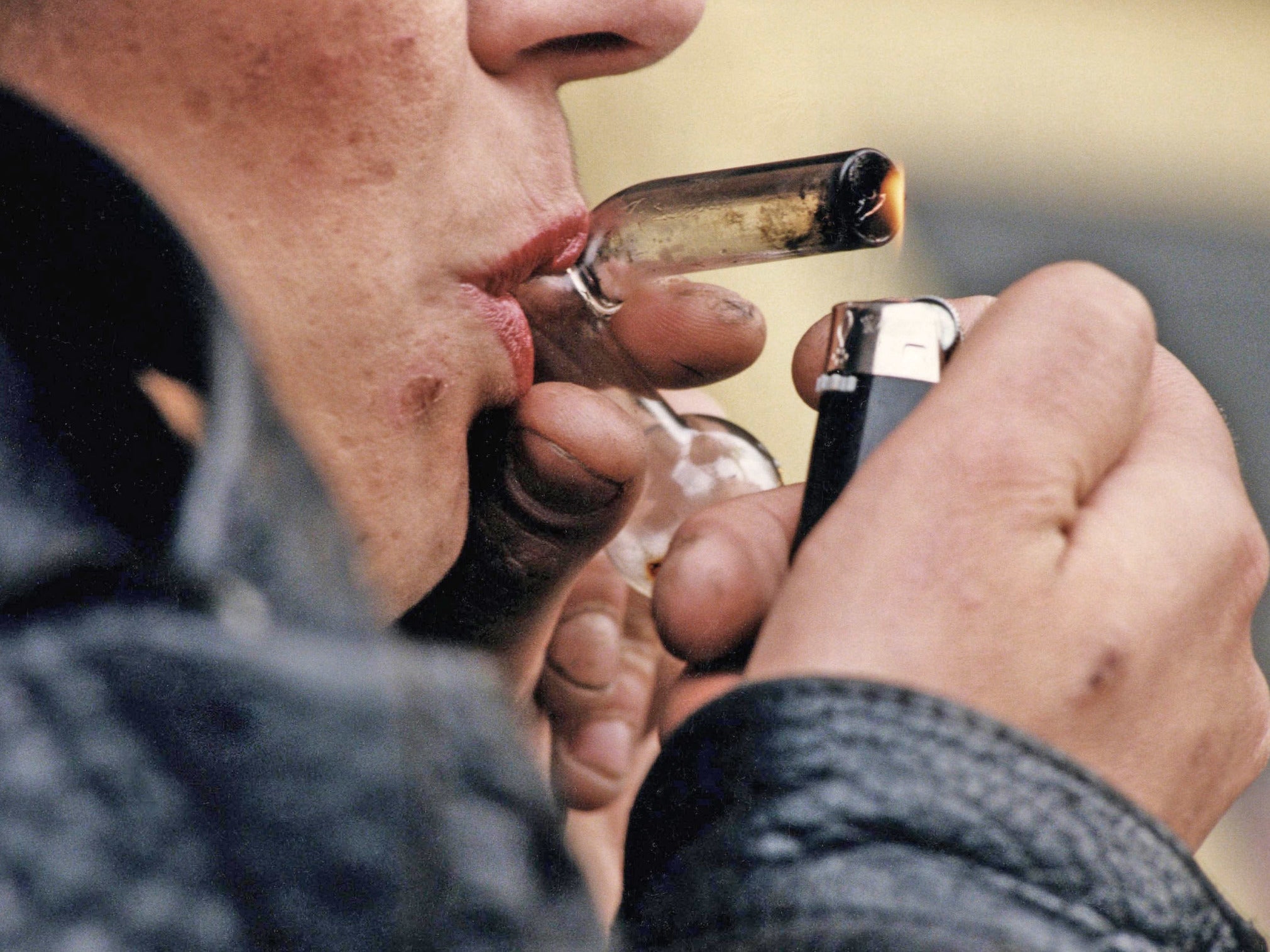Buy one, get one free offers and free samples fuelling boom in crack cocaine consumption, report warns
Crack use beginning to become ‘more acceptable, even fashionable’ among groups who would not previously have taken it, report says

Your support helps us to tell the story
From reproductive rights to climate change to Big Tech, The Independent is on the ground when the story is developing. Whether it's investigating the financials of Elon Musk's pro-Trump PAC or producing our latest documentary, 'The A Word', which shines a light on the American women fighting for reproductive rights, we know how important it is to parse out the facts from the messaging.
At such a critical moment in US history, we need reporters on the ground. Your donation allows us to keep sending journalists to speak to both sides of the story.
The Independent is trusted by Americans across the entire political spectrum. And unlike many other quality news outlets, we choose not to lock Americans out of our reporting and analysis with paywalls. We believe quality journalism should be available to everyone, paid for by those who can afford it.
Your support makes all the difference.Crack cocaine consumption is soaring in England, partly because of increasingly sophisticated dealers using marketing tactics such as “buy one, get one free” and “recommend a friend”, a government report has concluded.
Ruthless “county lines” gangs moving out of major cities to surrounding territories have coincided with a reduction in numbers of police hunting dealers, the report by Public Health England (PHE) found.
The report said dealers are marketing crack cocaine as more “user friendly” because it does not require injecting, and targeting younger users with mass messaging apps and buzzwords like “happy hour”.
Free samples and buy-one-get-one-free offers are given to customers who are already heroin addicts, while new groups such as “professionals, students and clubbers” are being successfully targeted, the research said.
Dealers offer lines of credit to users and even time messages or calls to coincide with benefits payments, the report said. While several respondents said they were given free drugs in exchange for the numbers of other local drug users.
The report was commissioned after the Serious Violence Strategy last year linked crack cocaine markets with violent crime, and government data estimated there were nearly 181,000 crack users in 2016-17, an 8.5 per cent rise from 166,640 in 2011-12.
The research says cuts to awareness and support services, reduced street-level policing, and a major global increase in cocaine production are luring more people onto crack, which is a more potent and addictive version of powdered cocaine that is smoked rather than inhaled.
The rise follows a decline in crack use since 2005-06, and to understand the changing pattern PHE interviewed police forces, treatment service workers and people using addiction services.
In half of the areas PHE studied, rising crack use was closely associated with county lines gangs – those based in big cities moving operations into smaller towns often using children to carry drug shipments around the country.
One addiction service users told researchers: “There is too much money to be made, and they [groups from London, Liverpool and Manchester] have flooded the area.”
While debts with local dealers could usually be settled, users said: “Out-of-towners are more violent.” Some said they had been attacked with hammers and made to work as drug runners to pay off debt.
“Some users don’t even bother with the heroin they get after a while, and crack has become more of the norm,” one anonymous treatment worker said. “It is a dealer-led strategy which has created the market.”
The PHE report calls for a focus on assessing the true extent of crack use, outside those in substance misuse programmes, as there were signs the drug was becoming “fashionable” among new groups.
“This included professionals, students and clubbers,” the report said. “In one area with a large university student population, there was a view that dealers were successfully infiltrating these groups.”
“We need to get a much better understanding of this group, who they are and what their lives are like,” said Steve Moffatt, public policy manager for addiction charity Addaction. “The more information we have, the more we can improve ways of reaching them.”
He added that it was “concerning” that the rise in crack use had taken so long to come to light.
“This report is truly shocking and highlights the reprehensible cuts to treatment centres and policing made by the Tories,” shadow home secretary Diane Abbott said.
PHE also called for more specialist crack addiction services as most treatment is focused on heroin addicts. “If I was a crack user and came in here, I’d think it wasn’t for me,” one service user told PHE.
Cuts to policing and health services, and the loss of schemes like the national Drugs Intervention Programme, have contributed to the escalating situation. Support workers based at police stations to refer people to treatment programmes are now only covered on an occasional basis.
Simon Kempton, operational lead for the Police Federation of England and Wales, said forces are even struggling to answer 999 calls, and that specialist drug services had suffered from major cutbacks.
“Every police officer signs up to help people and serve the community but we have reached a point where demand is outstripping capacity,” he said. “We simply cannot do everything that we are currently expected to, and this is just another example of that.”
Victoria Atkins, minister for crime, safeguarding and vulnerability, said: “The government is committed to tackling the illicit drugs trade, protecting the most vulnerable and helping those with a drug dependency to recover.”
Join our commenting forum
Join thought-provoking conversations, follow other Independent readers and see their replies
Comments